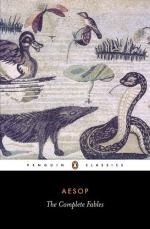A Wolf resolved to disguise himself in order that he might prey upon a flock of sheep without fear of detection. So he clothed himself in a sheepskin, and slipped among the sheep when they were out at pasture. He completely deceived the shepherd, and when the flock was penned for the night he was shut in with the rest. But that very night as it happened, the shepherd, requiring a supply of mutton for the table, laid hands on the Wolf in mistake for a Sheep, and killed him with his knife on the spot.
THE STAG IN THE OX-STALL
A Stag, chased from his lair by the hounds, took refuge in a farmyard, and, entering a stable where a number of oxen were stalled, thrust himself under a pile of hay in a vacant stall, where he lay concealed, all but the tips of his horns. Presently one of the Oxen said to him, “What has induced you to come in here? Aren’t you aware of the risk you are running of being captured by the herdsmen?” To which he replied, “Pray let me stay for the present. When night comes I shall easily escape under cover of the dark.” In the course of the afternoon more than one of the farm-hands came in, to attend to the wants of the cattle, but not one of them noticed the presence of the Stag, who accordingly began to congratulate himself on his escape and to express his gratitude to the Oxen. “We wish you well,” said the one who had spoken before, “but you are not out of danger yet. If the master comes, you will certainly be found out, for nothing ever escapes his keen eyes.” Presently, sure enough, in he came, and made a great to-do about the way the Oxen were kept. “The beasts are starving,” he cried; “here, give them more hay, and put plenty of litter under them.” As he spoke, he seized an armful himself from the pile where the Stag lay concealed, and at once detected him. Calling his men, he had him seized at once and killed for the table.
THE MILKMAID AND HER PAIL
A farmer’s daughter had been out to milk the cows, and was returning to the dairy carrying her pail of milk upon her head. As she walked along, she fell a-musing after this fashion: “The milk in this pail will provide me with cream, which I will make into butter and take to market to sell. With the money I will buy a number of eggs, and these, when hatched, will produce chickens, and by and by I shall have quite a large poultry-yard. Then I shall sell some of my fowls, and with the money which they will bring in I will buy myself a new gown, which I shall wear when I go to the fair; and all the young fellows will admire it, and come and make love to me, but I shall toss my head and have nothing to say to them.” Forgetting all about the pail, and suiting the action to the word, she tossed her head. Down went the pail, all the milk was spilled, and all her fine castles in the air vanished in a moment!
Do not count your chickens before they are hatched.




